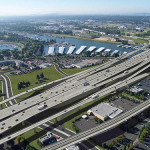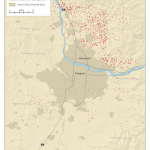Search Results
-
The Columbia River Crossing: Sightline’s Greatest Hits
If you’re a keen observer of politics in Olympia, you may already know that the Columbia River Crossing—a massive highway expansion and rail transit project connecting Portland, Oregon with Vancouver, Washington—has emerged as one of the most hotly contested issues in the negotiations over the state’s transportation package. But if you’re not from Portland, you may not understand how much controversy the CRC has generated. Critics from the right think...Read more » -
How To Fix the Washington Transportation Package
Washington’s new governor, Jay Inslee, has “pledged to reduce carbon emissions in the state’s transportation system.” He’s named a new transportation secretary, Oregonian Lynn Peterson, who appears to feel similarly. And in his most recent public statements about transportation, he’s talked about the need to preserve and maintain existing roads—a sensible priority that does little to boost greenhouse emissions. That’s the good news. The bad news is that as a...Read more » -
The Biggest Blind Spot of Urban Greens?
I have written in recent months about some of the land-use rules that make inexpensive housing uncommon or illegal: roommate caps, accessory dwelling unit rules, minimum apartment sizes and other rooming-house restrictions. What I haven’t discussed is the towering central obstacle to inexpensive housing—the elephant in the living room. Fortunately, Slate blogger Matt Yglesias has done the job well. His concise e-book The Rent Is Too Damn High explains how...Read more » -
ADUs and Don’ts
Last time, we reviewed accessory dwelling units’ (ADUs’) paucity and slow pace of development in most of the Northwest outside of Vancouver, BC. This time: the constraints that bind them. Why are accessory apartments and cottages so rare? One reason, no doubt, is that many homeowners do not want to host an ADU. But a more pernicious reason is that winning approval to rent out an ADU in most cities...Read more » -
A Real Fish Tale
Over the holiday season, the US Food and Drug Administration (FDA) issued an administrative finding that may remove one of the last obstacles before the agency approves the sale of genetically modified salmon in grocery stores. Here’s how we got to this point. In 1995, AquaBounty Technologies, a Massachusetts biotechnology company, filed an application with FDA to allow its engineered salmon as the first genetically modified animal into the American...Read more » -
How to Avoid a Federal Budget Train Wreck
In Washington DC, lawmakers’ attention is turning quickly to avoiding the so-called “fiscal cliff.” Unless the lame duck Congress can fashion a more sensible compromise, a set of measures automatically go into effect in January 2013: The Bush-Cheney tax cuts will expire for everyone, and “sequestration” will mandate budget cuts of $1.2 trillion over ten years, with half the reduction coming from the military and half from the civilian budget....Read more » -
Weekend Reading 9/21/12
Alan: The best article I’ve read on the US economy recently is, of all places, in the New York Review of Books. It’s a review of books by two Nobel laureates, Paul Krugman and Joseph Stiglitz, by two younger academics whose book Winner-Take-All Politics is one of the best things I’ve read this year so far. Their review blends their own incisive structural understanding of how messed up US government...Read more » -
Weekend Reading 7/20/12
Anna: For depressing but necessary reading, check Bill McKibbon’s latest in Rolling Stone. He calls it the most important thing he’s written since The End of Nature, way back in 1989. McKibbon does the math and it’s ugly. The fossil fuel that the oil and coal industries are planning on burning—the untapped reserves that companies are banking on—is five times higher than the “carbon budget” that would keep warming around...Read more » -
Regional Growth in the Portland Metro 2000-2010
Rural sprawl slowed on both sides of the Columbia after 2000. Yet Clark County’s rural areas still saw substantial population growth over the decade, while Oregon’s rural areas did not.Read more » -
Measuring Congestion Wrong, Version 3.0
There they go again. First, the Texas Transportation Institute came out with its urban congestion rankings. Then it was traffic firm INRIX’s turn. Now, TomTom, which makes in-car navigation systems, has its own urban congestion rankings. And as the Seattle Times pointed out yesterday, TomTom’s methods rank Seattle as having the continent’s fourth-worst congestion. Meanwhile, Vancouver, BC, ranks #2 on the continent, second only to LA.Read more »









